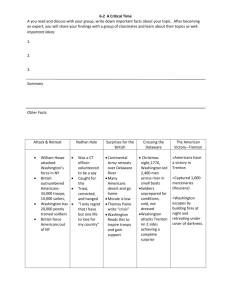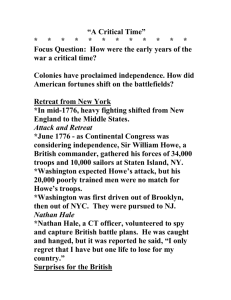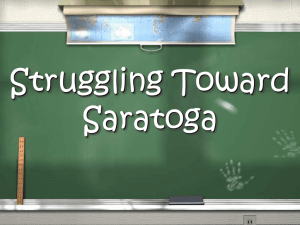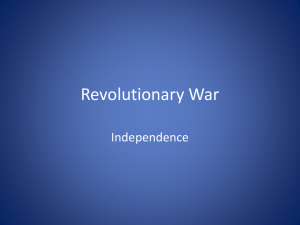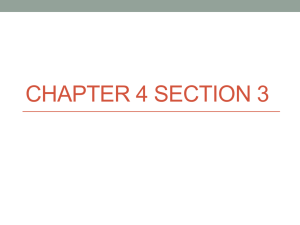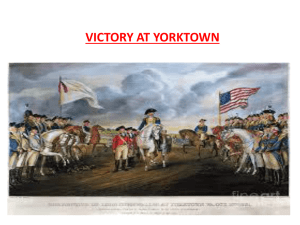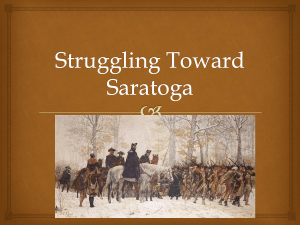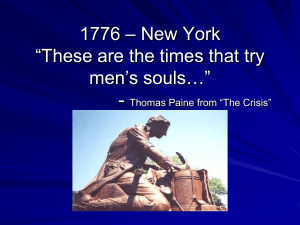Revolutionary War - Hardin County Schools
advertisement
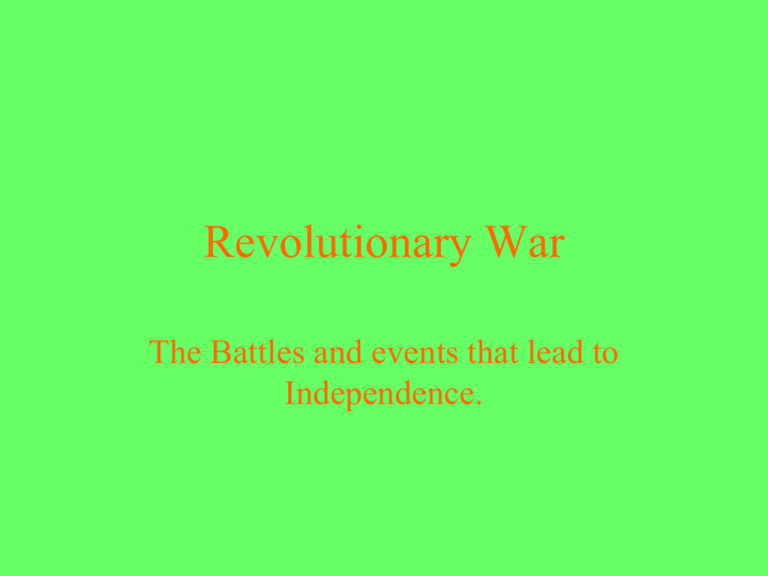
Revolutionary War The Battles and events that lead to Independence. Moving People to Independence • Thomas Paine wrote the pamphlet “Common Sense” • This turned many loyalist to consider independence from England as a viable and productive option. • Richard Henry Lee of Virginia was one of the first to offer officially in a document the ideal of independence. Declaration of Independence • A select committee of delegates were chosen to write the Dec. of Indep. • Thomas Jefferson was the actual author of the document • People in the delegation signed the document realizing they could be hanged for treason. • July 4, 1776 Independence Day (July 2) British Take New York • Washington figured Howe would attack in New York. Washington and 20,000 troops meet him there at Long Island. Howe arrived with 34,000 men and 10,00 sailors. Washington didn’t even have an army. • Howe killed 1400 men and forced Washington to retreat into Manhattan. New York cont’d • Howe had Washington and was ready to capture but stopped his men to fight fires in Manhattan. Loyalist were begging for his help. Washington retreated toward Pennsylvania. • Howe had Washington with in distance to fight and capture him but decided to stop and let his troops rest. Washington Retreats in New Jersey • Howe failed to capture Washington. • Washington took his thin, frail, unequipped army and prepared to raise morale. Soldiers were disserting the army daily. • Washington was afraid the war was about over. He didn’t think his troops could withstand. Trenton And Princeton • Washington took a chance and planned a surprise attack on Trenton and Princeton. • Trenton and Princeton were occupied by British troops and mostly German mercenaries. • Attacked on Christmas Eve. • Planned on troops being drunk from celebration. Trenton and Princeton • At Trenton Washington held his men through the night and watched the Hessians get inebriated. • He attacked at 8:00 a.m. Christmas Day. • The general was caught with his pants down and made surrender. • Cornwallis hears of the news and vows to capture Washington at Princeton. Princeton • At Princeton, Washington left the camp fires burning for Cornwallis to see. They attacked the camp site but Washington had left and flanked his men which led to a quick battle and surrender. • Washington wins at Trenton and Princeton. • Morale of Continental soldiers begin to soar. Battle of Saratoga British 3 pronged attack • The British had a plan to attack and capture Washington in New England. • Howe was to March south from New York to Albany. • St. Leger was to march west from Canada to Albany. • Burgoyne was to march north. Miscommunication leads to Disaster for British • Howe was under orders to seize Philadelphia first. He completed this task but didn’t march to Albany. He stayed in Philadelphia for the winter. • St. Leger was stopped and turned back by Benedict Arnold and his regimen. He never arrived. Miscommunication • Burgoyne was the only to arrive. • This was after many hardships of marching in swamps for days and having to clear paths to move artillery. • Burgoyne arrived but men was exhausted and needed rest and re-enforcements. • Burgoyne was captured and surrendered to American army at the Battle of Saratoga. Saratoga the Turning Point • The Battle of Saratoga created French Allies with the Americans. • France not only send money but send a navy and people to train the American soldiers. France Helps Out • Marquis de Lafayette brought soldiers from France and trained American soldiers. Will be Washington most trusted person. • Frederich von Stueben from Prussia will train American army. He had the best trained army in Europe. • Thaddeus Kosciusko built forts and casimir Pulaski trained to Calvary. Winter at Valley Forge • The American army was in hard times for supplies and their morale. • Soldiers were sleeping on open cold ground. • They had few blankets, clothes that barely covered them, little food,no shoes, frost bite, and soldiers where having to train daily. Many soldiers died and others started to dissert. Washington becomes very strict. Valley Forge • Martha Washington arrived at Valley Forge to help nurse soldiers and to sew clothes. • Spring came and supplies arrived. • The morale of the American soldiers had increased drastically. • Battles in the West Native Americans will help the British in the west because of Americans taking their lands. – British try and take Fort Vincennes. – George Rogers Clark and his men surround the fort and the British give up without much of a fight. – Spain aids the Americans Battles in South • British Navy is controlling most of the south. • British Seize Savannah Georgia, Charleston South Carolina, and Camden South Carolina. • The British start to lose their strong hold on the south. Battles of South • The Americans take over the Carolinas and Savannah Georgia. • The Americans win a huge battle at King’s Mountain. • This is really the turning point of the year as far as confidence and morale. Women in the War • Many women cared for the troops at the front. Provided medical assistance and helped to produce clothing. • One women took on the role of a blacksmith. • Molly Pitcher actually took water to the troops and once picked up husbands rifle and fought. • Betsy Ross sewed flags for Washington’s army. African Americans in War • Many of the slaves fought in the Revolutionary war. • They fought on the American side hoping for freedom from slavery. • Freedom from slavery was not given. • This will start the big debates over slave and free states. Benedict Arnold • Was one of the best American Generals in the war. • Controlled West Point in New York. Became angry for lack of recognition and tried to turn over West Point to British. • Americans found out and were to hang him before he switched sides. • Died a traitor and poor man in England. Battle of Yorktown. • Cornwallis went to Yorktown VA to cut off the shipping of goods to the colonist and to wait for more supplies and re-enforcements. • Washington, Lafayette, and Rochambeau all joined forces and surrounded Cornwallis at Yorktown. • Admiral de Grasse used his fleet to blockade the bay area. Yorktown. • Cornwallis tried to flee across the river but the attempt was unsuccessful. He then had to surrender at Yorktown. • Lord North of Britain when he heard the news stated “oh my God it is all over” • The United States win Independence. • British have to go back to Europe and fight French. Treaty of Paris • April of 1783 • British recognize the colonist as United States of America. • U.S. gets all land from Atlantic coast to Mississippi River. Spread south to Florida which remained with Spain. • Americans agreed to pay loyalist for land lost. It never happened. War 8 years long. Problems in forming a New Nation • • • • • Government Economic States rights versus national Government Newly acquired land. Lack of trained soldiers and no navy for protection Government Problems • Each state wrote its own Constitution. • Each state had its own set of laws independent of Federal Government • No state wanted to realize power to a central government. They were afraid of tyranny by someone like a king. • Inability to enforce laws Economic Problems • • • • Each state coined its own money system. States would not accept other states money. People were going bankrupt. Only states could raise money through taxes. No money for federal government to operate or pass laws for trading protection. Land west of Appalachians • How do we determine what happens to land west of Appalachians. • Land Ordinance of 1785 stated that land would be divided up into 36 sections of one square mile. Land would be sold for $640.00 and one section would be reserved for government and public schools Northwest Ordinance • Stated that all future lands would be divide up into territories. • State that settlers will have individual rights and there would be no slavery in the territory. (watch for this in future) • When a territory had 60,000 settlers it could write a Constitution and be admitted as a state. Illinois, Indiana, Ohio, Wisconsin etc Trade • Not only could the new government named the Articles of Confederation pass taxes but it couldn’t limit imports. • Britain and other countries flooded our markets with their cheaper products. • Countries closed ports to us. • The U.S. goes through its first Depression. Shays Rebellion • In Massachusetts, the state legislators were passing taxes to help rebuild after the war. • The farmers could not pay their taxes therefore Massachusetts foreclosed and sold their land. The farmers rioted and the state militia was sent in. • A change must happen……in comes the Constitution.
